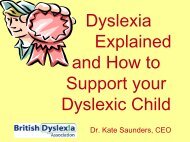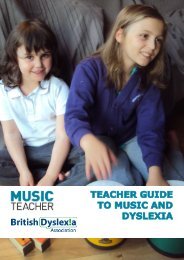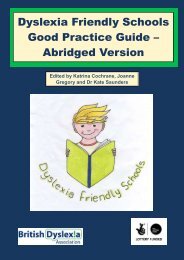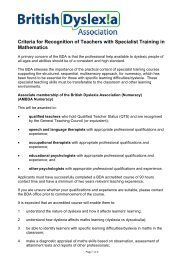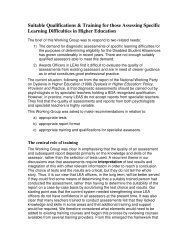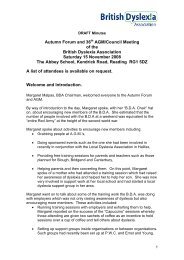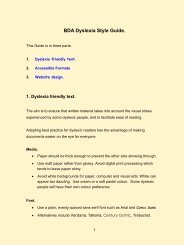Intervention for Dyslexia - The British Dyslexia Association
Intervention for Dyslexia - The British Dyslexia Association
Intervention for Dyslexia - The British Dyslexia Association
You also want an ePaper? Increase the reach of your titles
YUMPU automatically turns print PDFs into web optimized ePapers that Google loves.
4 Screening and assessment<br />
4.1 Identifying children with dyslexia<br />
In the context of this review, the chief purpose of screening and/or assessment is to<br />
identify children who require intervention. However, assessment can also play a role in<br />
determining which particular intervention programme would be most appropriate, in<br />
shaping the delivery of that programme (e.g. starting points, amount of overlearning<br />
incorporated, rate of progression expected) and in evaluating the impact of an<br />
intervention on a given child or group of children.<br />
Traditionally, the task of identifying children with dyslexia was exclusively carried out by<br />
educational psychologists, primarily using psychological instruments that were ‘closed<br />
tests’ (i.e. restricted to use by qualified psychologists). It is not within the scope of this<br />
review to provide a full coverage of the ways in which dyslexic children can be identified<br />
by educational psychologists. Detailed descriptions of methods and tests are provided<br />
elsewhere (e.g. Beech & Singleton, 1997; Reid, 2003; Thomson, 1990; Turner, 1997).<br />
Increasingly, however, teachers are taking on the task of identifying dyslexic pupils,<br />
partly because the level of demand stimulated by increased awareness of dyslexia<br />
cannot be met by the very limited number of educational psychologists available, but<br />
also because of the availability of screening tests and assessment instruments that<br />
teachers are entitled to use. <strong>The</strong> chief focus of this chapter will there<strong>for</strong>e be on<br />
screening and assessment methods that are accessible to teachers.<br />
4.1.1 Intelligence and discrepancy<br />
Until relatively recently, the identification of discrepancy between the child’s IQ and their<br />
attainments in literacy was a key part of the diagnostic process (see Section 1.2.2 <strong>for</strong><br />
explanation of the discrepancy criterion). Over the last two decades, however, there has<br />
been a growing reaction against the use of IQ in determining dyslexia, largely because<br />
poor readers whose reading skills are discrepant from IQ cannot be adequately<br />
differentiated from poor readers whose reading skills are not discrepant from IQ (e.g.<br />
Fletcher et al., 2002a, 2002b; Joshi, 2003; Lyon, Fletcher & Barnes, 2002; Seigel, 1989;<br />
Sternberg & Grigorenko, 2002; Vellutino, Scanlon & Lyon, 2000). Consequently,<br />
there<strong>for</strong>e, psychologists are tending to place less emphasis on discrepancy and more<br />
emphasis on cognitive indicators such as verbal memory, rapid naming and phonological<br />
awareness. However, there is a counter-argument in favour of retaining a role <strong>for</strong><br />
discrepancy: Kavale (2005) and Thompson (2003) argue that there is still a relevant<br />
place <strong>for</strong> discrepancy because only measures of discrepancy can document the<br />
unexpected nature of the problem. <strong>The</strong> existence of a discrepancy indicates the<br />
presence of underachievement but only the possibility of dyslexia.<br />
4.1.2 Predictors of reading difficulty and dyslexia<br />
Scarborough (1998) carried out a meta-analysis of studies of early predictors of reading<br />
difficulties. <strong>The</strong> results are summarised in Table 8. It can be seen that the strongest<br />
predictors include verbal memory, phonological awareness, letter identification, object<br />
naming and general language skills. <strong>The</strong>se findings have been replicated in a large<br />
number of other studies carried out in several countries (e.g. Boscadin, Muthén, Francis<br />
76 <strong>Intervention</strong> <strong>for</strong> <strong>Dyslexia</strong>



